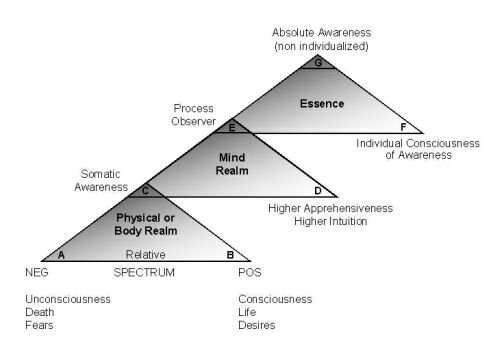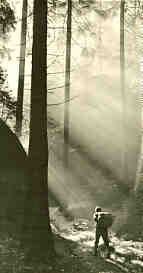February 2005
![]()
Essays, poems, opinions and humor on seeking
and finding answers to your deepest life-questions
|
This month's contents:  Mountain cabin
Mountain cabin
Jacob's Ladder (part 1) by Richard Rose | Poems by Shawn Nevins | Using Time Wisely by Shawn Nevins | Soul Sickness by Jones Very | The Ego by Art Ticknor | O Come All Ye Faithful by Art Ticknor | Choice by Jim Burns | Containing Tension by Bob Fergeson | Humor
|
Jacob's Ladder (part 1)
by Richard Rose
~ From a talk given in Los Angeles
Most of you are new to me; we've never met before, and beyond a doubt everybody comes in from a different perspective. I've given quite a few talks all over the country, and have come away after each one with the feeling that I only communicated with a fraction of the people, because of language. Everyone talks a different language.
So I've always been laboriously looking for some way to get around this difference in language. I have a system of thinking on psychology, which I'm very happy to share; I'm very happy to go to whatever strain is necessary to communicate it to you. The general diagram of it is in figure 1 (from Psychology of the Observer, "Jacob's Ladder").
 Jacob's Ladder diagram from Psychology of the Observer
Jacob's Ladder diagram from Psychology of the Observer
I also talked about this the other night to a little group, and again came away with a feeling that unless someone had done similar thinking, similar reading, in an intense desire to understand psychology—not in the way it's written by the so-called authorities...
Authorities are generally political in source. By that I mean that we have a political psychological atmosphere. Our sociology is political. Politics determines funding. And when it gets down into what I consider the more sacred sciences, psychology is one of them. It's the mind. This is a sacred territory; we don't need politics with its funding pressures to call the shots. We're interested—I hope—in what the mind is, and not what we should vote it to be by democratic agreement.
If I were take you through, to explain me, my conviction, my findings—it's perhaps a rather complex thing; which would take many many hours of bringing our heads together, number one. Because we've got a different interpretation of the word sanity, for instance.
Sanity is a very loose word; I've talked to a lot of psychiatrists, and never found a single one who had defined it. Yet they're shooting people with hypodermics and feeding them pills. To get predictable results, they think, on the surface, but what are the results under the surface, or later on?
But anyhow, in talking to people I prefer a sort of dialogue, because in a situation where you can talk or you can ask questions, I get an idea where you're coming from; I'll possibly intuit a language or choice of words, reference points, if possible, by which I can communicate with you. But for a man to get up in front of a group of people and preach—this can be monotonous and irritating as hell. And yet talk is necessary.
What we're dealing with is perspectives. I made a few notes on them, on perspectives, in the hope of, because of the knowledge of the differences in perspectives, possibly finding a way of coming together in a single perspective for an hour or so.
I have some questions in regard to that. I put them in question form, because I'm not saying this is, necessarily. It's bad when you say something definitely is, in all instances, because in subjective matters especially, somebody else's opinion might get you to the same point. Even though it seems to be diametrically opposite, you may ultimately come to the same point in thinking.
1. What liabilities are incurred with unavoidable states of mind?
We all come here with a state of mind. And you're not going to change it in five minutes.
2. Are perspectives rooted in valid bases and definitions, or in indefinable feelings which may be as meaningful as definitions?
All of us here are old enough to have developed a philosophy of life. And we like to think that this is highly logical. Then you run into another fellow who has a perspective or conviction strictly from feeling. He doesn't make any pretense of logic. And after you suffer the fellow—if you don't agree with him immediately you might suffer for awhile—you find out that you agree with him, or that you're talking the same language. I've had this happen repeatedly.
What is meaning? When we talk, say, about the mind, what are we talking about? Everybody has a slightly different understanding, and there are different understandings for the mind and I think some of them are valid. I see two or three definite minds. So when one person is using the word mind he might be referring to Mary Baker Eddy's "Universal Mind." Another might be referring to the objective psychologist's somatic mind.
The same with our appreciation of things like colors. Or pleasure. What do you mean by the words "high" or "green"? Do we know that all people see the same color green? The only thing we know is that we all do respond, pretty much. But what does the fellow actually see when he sees green?
Why do some perfumes seem to attract some people and irritate others? And a lot of them do irritate you after you've been exposed to them for awhile.
3. What is beauty?
Everybody's talking about the ideal parts of life and the aspects of life like the nice things, that everybody's going to get for themselves and for their neighbor. What is beauty? I used to say it's the degree of refraction by which light comes to the eyes. Looking at the outside of the skin it looks pretty good, but if you peel it off and look at it from underneath it might not look so good.
4. What is goodness?
Is goodness recognized by the cat the same as goodness recognized by the mouse?
5. How do perspectives affect science?
I see this in science, which is supposed to be perfect: people come in with different perspectives. On the same day on the radio I heard one man say our temperature was changing; that possibly—I didn't get into all the details—if we had four consecutive cold winters we'd have an ice age of some sort. That the earth was swinging away from the sun, possibly, or something was happening. Another fellow said the ice cap is going to melt, and in so many years, unless they can stop this smog and air pollution, Atlantic City will be under water, the coastal plateaus will be flooded.
So these are perspectives in science by people who spend their entire lives studying it.
6. What is wisdom?
I presume this is what we're trying to do in this work—to get the best answer. And is wisdom a foolishness? A lot of people after living sixty or seventy years say everything is foolishness. Your perspective changes. The wisdom of the twenty year old boy becomes idiocy to a seventy or eighty year old man.
7. Is wisdom a wasted achievement unless it is restricted to objective or material values?
We define our wisdom - some people do - in terms of how many millions it will make you, and the idiot is the guy who winds up with nickels. Or is wisdom the man who gets along with his fellowman? Some think that's a form of wisdom.
Now we talk about perspectives on authority. A man quotes, he throws something out at you, and he says, "This is what they say." And everyone shudders and remains silent.
When you get into psychology, I've got a dual path here that I'm talking about. You'll notice in the diagram up at the top is the word Absolute. Down at the bottom (line AB) we have simple psychology. And I maintain that you can attain or reach an absolute objective by beginning with a simple analysis of a somatic self.
I was talking with one of the fellows here last night, and he said, "I saw that diagram, and I can't see—you've got the word Intuition there and on up it seems even harder to understand, something about Unmanifested Mind." And I said, "Stay off of those upper steps. You're not supposed to be up these at all; this is a diagram of probability or possibility."
But the lower triangle (ABC) is very apparent. Our whole life is in a relative dimension (line AB) and this is where we lay. Not even up into the pyramid. We wallow eternally between the positives and the negatives, between masculinity and femininity, between concepts of goodness or bad, propitiousness or unpropitiousness, light and darkness, and all this sort of thing. So that we never reach a united type of sanity. Which is the thing up at the top (point C).
Now why am I mentioning all of this? Because—where is the perspective that you run into in most of the philosophy, or let's say theology that you encounter? God is postulated before proving him; this is what you run into. And we are hushed into silence. We don't dare say anything, because so many people believe.
And of course this is the difference. When Dan said in the introduction that I'm a rebel, that's my rebellion. I maintain that I'm ignorant. And that's where I started from—ignorance, not wisdom.
You contemplate what's in front of you, not something way up above. That's the reason I say the figure has no meaning, except as something I discovered. It's like the Katzenjammer Kids, it's a cartoon. But maybe something's in it for you too, I don't know. It may have some meaning.
You can not contemplate God. Much less legislate that you don't dare say anything contrary. Because you get authorities. What's an authority? A man who sweats or wallows through six or eight years of college. He may have been drunk all the time he was in there, but when he comes out he's a theologian and he's an authority. And he says, "God told me to tell you."
And people say, "Ok, whatever you say." You see what's going on over in Iran. You've got rule from possibly a subjective state or a subjective dimension.
So what else do we postulate? We postulate that wisdom is decided by democratic process. We have the best system on earth; all we have to do is vote. And this permeates, unfortunately, the study of psychology. Psychological findings today are the result of the acceptance of the normal curve. And normal is that which is 51 percent or more of the behavior. So that when 51 percent of the people become murderers, or anything else, it is normal.
Consequently psychology has ceased, at least in that degree. Now I'm not saying Carl Jung, for instance, would approve of that, but I'm saying this is a trend. That we have decided that the human collective mind is infallible. Instead of saying that the truth is the truth, in the year 1000, in the year 1500, in the year 2000, the year 3000 or 10,000. Truth is the truth; it doesn't change because it's unpopular at the moment.
What constitutes the human mind is as unchangeable as the protoplasm in that human's body. If you take a chemical analysis of it, you might have a different reading, say, in the year 1800, you might have a different concept of the blood circulation or something, which may have been what I call relative truth at that time. But as you approach it, it becomes closer to absolute truth.
Q. How can you say truth doesn't change?
R. Just by virtue of its definition.
Q. So? Some thing's true one day and not true another day...
R. No, no. The conclusion was not true the other day. Truth itself doesn't change.
Q. No.
R. Well, let me put something this way. Maybe I'm crazy. But let me run through this little bit of craziness, and if you don't approve of it and don't get anything from it, I'll apologize. But I don't really intend to try to prove to you a whole lot. I'm going to throw something out. If it looks good to you, Ok. If it doesn't—you've wasted your time. And maybe even I have, to a certain extent.
The same thing has to do with some other of our concepts about attitudes and authority. Our concepts of love. And a lot of our social study of interrelations between people and this sort of thing is not dependent upon a true understanding of people, but something perhaps that we'd prefer to have. We don't particularly want the truth; we want a certain state of things to exist.
8. Does a man love? Or is he even capable of loving? Or does a man desire to be loved?
Who loves more, the lover or the tick? Does a tick love a dog - or the blood? He sticks pretty close. And some people in their human relationships stick very close. But maybe it's parasitical.
9. Is love of every and any kind programmed?
Have we got any choice in this matter? We think we're doing things. Are we doing things?
10. Is there only one dimension?
Now the reason I'm questioning this—in the human effort, whether it's philosophical, religious, or what, there seems to be an effort for action. Now what is the difference in these types of actions? There are differences in perspective, and what's the difference in the type of action?
I maintain that action without definition is foolish. This is what you have—that people are acting and not defining what they're doing. To give you an example, a person says, "We're going to make the world safe for democracy. That's our group. Our little group is going to make the world safe for democracy."
Another group says, "We're going to serve God." They haven't defined what they're going to serve. Another thing that is very important that nobody hardly thinks about—they haven't defined the seeker, or the one who's trying to serve. The potentials and capabilities of that person to do anything, much less to serve a subjective, almost unattainable thing.
Now don't get the idea that I'm negating God. I'm not saying that there is none. I'm saying it's foolish to postulate. Definition should precede action; at least some common sense attempt at it.
~ Continued in the March 2005 TAT Forum
![]()
© 1976 Richard Rose. All Rights Reserved. This talk is available on CD through Rose Publications.
![]()
Poems by Shawn Nevins

|
The body said, But you know skin and words Inside, Today, * An outline of life * "Dawn" A pale lavender sky * Breeze, * At the end of every word is another. |
![]()
Using Time Wisely
by Shawn Nevins
People often don't realize the ways they could maximize their efforts. Small habits of inefficiency bog down the spiritual search. There are ways to let your search seep into every aspect of your life. A line from the great photographer Ansel Adams' autobiography comes to mind: "Whether I walk at Point Lobos, fly in an airplane, move in a new environment, or relax [my emphasis] in my home, I am always seeking to relate one shape or value to another, seeing an image in my mind's eye. It is a glorious and rewarding exploration." It takes time, but eventually you find that even while relaxing you can work on some aspect of your quest.
For example, I used to read a little from a spiritually themed book before I went to sleep. I believed that one's last thoughts before sleep would influence their dreams. Why not fill those six or eight hours of sleep with dreams of significance rather than of chasing women or other frantic running? Some find that they can go to sleep with a problem on their mind and a solution appears during the night.
by Salvador Dali
In the morning, forgo the news at breakfast and read a book, listen to inspiring music, or practice Vipassana's mindful eating (see Goldstein's The Experience of Insight). Your mind will be more alert and attentive. It will provide meaningful thoughts to fill those moments during the day that you normally mull over worries or petty conflicts.
While commuting, listen to lectures on tape or ride in silence rather than wasting time with talks shows, news, or pop music. Douglas Harding has a meditation for driving that gives insight into one's true nature.
Curtail daydreaming with a mantra or prayer. I was so plagued by senseless daydreams that I took to heart Richard Rose's advice to think of nothing rather than tolerate rambling thoughts. I would count from one to ten, over and over, until the daydreams receded.
Skip the lunchtime gossiping and find a quiet place to break the work or school state of mind. You fall in habitual patterns of thought at work and school that you only see if you step outside and get a breath of fresh air. You remind your self what is truly important.
When in the mood to talk, find a spiritual friend. Discuss your latest endeavors, rather than talk sports or what's happening at work. Or take a different approach and ask your self why you feel the need to talk. Do you really have something you want to say, or are you burning off nervous energy that could be saved and channeled to your ultimate goal?
Let your exercise double as time for self-observation (notice when your body wants to stop exercising, how if you keep pushing the body goes along with your desire, and how that same pattern of action and resistance applies in other areas of your life), reviewing your reactions throughout the day, or as a moving meditation. Simply watching the muscles move is amazing. Try to determine when you consciously move the muscles. Where did the thought to raise your arm originate? Who decided when your arm would stop moving? Watch closely.
If you are exhausted or feeling ill and choose to watch tv or a movie, pick something thought provoking rather than completely escapist. I was haunted by Rose's line, "If you need entertainment, you are asleep."
There are interesting and inventive experiments to conduct while doing mundane chores. Use your meals to test the effects of different foods upon your thinking or your energy level. Observe people while grocery shopping. Test your intuition about what people will do or say. At any time, practice awareness of your thoughts and look for their cause and origin. Make notes of patterns of thoughts—thoughts you have around certain people, places, or situations. Break up your routines by driving or walking a different route. Smile when you are sad, or frown when happy. Notice and remember the results of your experiments. Keep a notepad handy to record your observations and inspirations.
The cumulative motion of these moments of seeking build your self into a vector—they forge a direction for your life. Like learning to type, one day you realize you no longer need typing exercises. You simply type. What requires effort at one point eventually becomes relatively effortless. Especially since, as your wisdom increases, your sense of doing anything decreases. To paraphrase Richard Rose: you simply seek the truth because you are a seeker of truth; not because you want any particular result. You become a humble, ego-less vector.
Some will fear this approach as too Spartan and extol the virtues of simply being and relaxing. Don't worry. You won't ever have a problem wasting time. The world is filled with passionless people passing the time, their lives, away. That is why this essay won't affect many people. Some understand the importance of self knowledge, a few intuit the immense depth of their self ignorance, and only a lucky few follow with determination their inner passion for an answer. "It is a glorious and rewarding exploration," for those lucky few.
![]()
Soul Sickness
|
The Ego
by Art Ticknor
The final, most obstinate, and most wily of all obstructions to crossing the finish line to Nirvana is the ego.
The ego is not:
- Pride ("He's a proud fellow, struts around like a rooster").
- Selfishness ("She only thinks of herself").
- Narcissism ("He's in love with himself").
- Something to school, polish or perfect.
- Something to try to minimize or to kill off.
The ego is not a collection of our negative attributes. The ego does have a game it likes to play, though, splitting the personality patterns into two camps: the "good" ones that it identifies with (me, the saint, the angel) and the "bad" ones that it disowns (not me, the devil made me do it, the sinner).
The ego is a belief planted in us by what created us—a belief that we're something (some thing).
The ego is the individuality-sense itself. It is the "I am" that identifies with certain forms, feelings and constructs:
- I am hungry.
- I am the guy in the mirror.
- I am the person who wakes in the morning and falls asleep at night.
- I am unhappy.
- I am the person who was born a certain number of years ago and will die at some uncertain time in the future.
- I am the person with this name and this set of personality traits and memories that make me unique.
- I am lovable.
- I am the individual body-mind that is separate from other body-minds and whose existence is threatened and subject to extinction.
- I am the spirit or soul that will survive the death of the body.
We view our life-experience through the sense-of-self. It is the innermost observer that we're identified with and is thus not something that comes into our view. So how can we observe it?
Richard Rose has the most practical, common-sense system for bringing this about that I've come across. The general outline is one of retreating from false identification (a process which Merrell-Wolff also touched on in his "Induction" talk). It's not a logical process that can be conducted by analysis or argument, but a process of introspective observation. A sample progression might go something like this:
- I have a body—which implies that it's not the innermost me.
- Similarly, I have thoughts and feelings—admittedly more interior possessions than my shirt and shoes, but still not me.
- I can scrutinize the beliefs and convictions that run my life, thus putting them more consciously into my view, where I realize they, too, are possessions (or obsessions).
- I can view my decision-making process—first indirectly, by looking at the results, and then directly—seeing that this process is part of the mind's automatic machinery that functions regardless of whether I'm aware of watching it or not. I see that I'm not "the decider," and yet I insist that I'm the final arbiter.
- I can see that I'm not "the doer," since action results from thought, which has already happened when I become aware of it. Yet despite lack of control, I try to be in control. After all, what would happen if I just gave up?
- I can view and review my defensive reactions when I feel threatened—anger, sarcasm, lashing out, withdrawal, arguing, feeling superior, feeling hurt, shocked, rejected, looking for comfort, replaying events in my imagination and having them come out differently, planning revenge, etc. These threats are afflictions to the individuality-sense and therefore clues to its existence and whereabouts.
- As Merrell-Wolff sums it up: "I'm not the mind, I'm not the feelings, I'm not the body—that I see. But I surely am, I surely am an individual, apart from others."
This sense of being something apart is the ego. Eventually there is a direct seeing into what we're looking out from and a realization that the only observer is the Observatory.
![]()
O Come All Ye Faithful
by Art Ticknor
|
There are those who have faith in Me And there are those who don't have faith in Me Are you unsure of what direction to take, I am the path to all that life has to offer, Thus speaks your inner self, |
|
![]()
Choice
|
Containing Tension
by Bob Fergeson
We are cowards, and what we witness about us is
a dynasty of fear in a play house of desires. —Richard Rose
 Most of us go through life with no clear awareness of our limited time and
energy, but instead continue to plan and plot our way along as if nothing will
ever really change. We live to have fun, known as the pursuit of happiness,
making our forays into the world of pleasure from a base of imagined security.
Driven by the fear that our security is tenuous at best, we rush to have even
more fun, before the circle of our dissipation and paranoia collapses in on
itself. We never question our motivations or bother to define what we mean by
happiness, perhaps because of an inner intuition that that would take the fun
out of it. Let's take a look at what this pursuit really is, and how it can be
turned from a struggle downhill into frustration and bitterness into a change of
being. This pursuit of happiness can best be defined as the pursuit of a fading
memory, a memory of a time when some outside agent gave us a thrill of such
magnitude we can't forget it, or else it relieved our anxiety so well as to
leave us in a state of unusual peace. Being creatures of habit, we try repeating
the same sequence of events that gave us the previous result. This cycle is
sooner or later found to be one of ever-decreasing returns. We find the thrill
or release lessen, while the inducing agent is needed in ever greater quantity.
We never question the process itself. We never wonder why we even need an
outside agent in order to feel happy, at peace, or complete. Only when the agent
turns on us, and becomes the deliverer of pain and misery instead, do we stop.
Even then, we still seldom question the process, but think we can beat the
system by getting a new, improved agent and becoming cleverer in its application.
Most of us go through life with no clear awareness of our limited time and
energy, but instead continue to plan and plot our way along as if nothing will
ever really change. We live to have fun, known as the pursuit of happiness,
making our forays into the world of pleasure from a base of imagined security.
Driven by the fear that our security is tenuous at best, we rush to have even
more fun, before the circle of our dissipation and paranoia collapses in on
itself. We never question our motivations or bother to define what we mean by
happiness, perhaps because of an inner intuition that that would take the fun
out of it. Let's take a look at what this pursuit really is, and how it can be
turned from a struggle downhill into frustration and bitterness into a change of
being. This pursuit of happiness can best be defined as the pursuit of a fading
memory, a memory of a time when some outside agent gave us a thrill of such
magnitude we can't forget it, or else it relieved our anxiety so well as to
leave us in a state of unusual peace. Being creatures of habit, we try repeating
the same sequence of events that gave us the previous result. This cycle is
sooner or later found to be one of ever-decreasing returns. We find the thrill
or release lessen, while the inducing agent is needed in ever greater quantity.
We never question the process itself. We never wonder why we even need an
outside agent in order to feel happy, at peace, or complete. Only when the agent
turns on us, and becomes the deliverer of pain and misery instead, do we stop.
Even then, we still seldom question the process, but think we can beat the
system by getting a new, improved agent and becoming cleverer in its application.
As incredible as it sounds, an unhappy man does not realize that happiness is better than unhappiness. Knowing only his own concealed anguish, he worships it, which is the same as self-worship. —Vernon Howard
This unconscious trap of worshipping our own weakness keeps us from becoming strong. We fail to realize that the tensions we feel, as anxieties or promptings, are the very things that will free us from all need, if we stand up to them. By giving in to every prod and poke that comes into our consciousness, we give away our time and energy to nothing, and keep nothing with which to build our mental strength and intuition. Through resisting these daily irritations and promptings, we save our vitality and time, which can then be put to use on the spiritual path. We also become something, something that has a greater capacity. We can think clearer, have more time for study, and come to have a resistance to the inner noise, which used to send us running for distraction or numbness. We will have increased our capacity for storing tension dramatically, much like putting our money in a bank that pays high interest, to be used for something of true value when the time presents itself, rather than spending every dime in our pocket, and relegating ourselves to living paycheck to paycheck. Eventually, we will also have gained enough inner quiet to possibly hear something from within, giving our intuition a chance to be heard.
Be very careful that you do not unconsciously assume that nervous tension is power. This is vital. Watch yourself the next time you work toward some goal. Look very closely to discover tense feelings and nervous thoughts whirling around inside. Do not let them deceive you into assuming that they are creative forces; they are not. They are thieves of genuine powers. As always, your awareness of their thievery is your first fine step toward casting them out. —Vernon Howard
The energy we feel as excitement or thrills, is not the energy we are after. This is just the frenzy of a nervous mind, of thoughts and needs wanting to take advantage of us in exchange for a brief moment of peace when our stolen energy is gone. True strength and peace is in an increased capacity for tension. By increasing this capacity, we increase our resistance to the effects of life. We become calmer in the face of stress, and can think clearer under pressure. By virtue of our increased intuition, we may even begin to see through many of the traps we formerly succumbed to. Our patience will increase, and we will not panic and run when unflattering truths about ourselves come into the light of day. We will be able to sit and meditate for the lengths of time necessary to gain insight into these truths about ourselves, no longer giving into distraction, fear or pride. Through this reversal of the trap of dissipation into the discipline of containment, we gain a chance at freedom, and have become something more than a utility of forces unseen. We now have the possibility of using our limited time and energy in real ways in the pursuit of self-discovery. Our imaginary life of having our cake and getting to eat it, too, becomes instead a life with a true direction, towards truth and self-knowledge leading to real happiness. The Kingdom of Heaven is truly within, and we will not find it by taking our pleasure and meaning from without, from the world and its ceaseless change and pain. The next time you feel an inner prod, an urge, an itch from below which you know can only be scratched at the price of your peace of mind, do not think that relief is in doing what it wants. Try resisting, turn away. We graduate from crawling by gaining enough strength to stand up and walk. Walking upright depends on having enough capacity for tension to resist falling down. Be patient, and learn to walk without wobbling. The view is better and you can cover greater ground. By this resistance, become something greater than the world, and take your meaning and definition from the silent strength you then find within.
To avoid action, thou must first determine for great action. —Richard Rose
~ See Bob's web sites, The Mystic Missal, NostalgiaWest, and The Listening Attention.
![]()
Humor...
 An Engineer's take on this subject:
An Engineer's take on this subject:
Postulate 1: Knowledge is Power
Postulate 2: Time is Money
As every engineer knows:
- Work/Time = Power
Since Knowledge = Power, and Time = Money, we have:
- Work/Money = Knowledge
Solving for Money we get:
- Money = Work/Knowledge
Thus, as Knowledge approaches zero, Money approaches infinity regardless of the Work done!
Conclusion: the less you Know, the More you Make.
~ Origin Unknown. (Compliments of Steve Harnish.)
Reader Commentary:
(We appreciate hearing from you.)
|
Sign up for our e-mail alert that will let you know when new issues are published. Contact the Forum for questions, comments or submissions. Want to help? Your donation of $5 or more will support the continuation of the Forum and other services that the TAT Foundation provides. TAT is a 501(c)(3) not-for-profit educational organization and qualifies to receive tax-deductible contributions. Or, download this .pdf TAT Forum flyer and post it at coffee shops, bookstores, and other meeting places in your town, to let others know about the Forum. |



 Ego is a very phony, slippery, and difficult thing to get hold of. Everything is
"I did, I thought. I this and I that." In my opinion we are at the crossroads of
becoming. We have nothing to do with how things got here or where they are
going. If you really examine the thing, you are just sitting in a theatre while
this is taking place. You are where it happened, and that's about all you have
to do with it. The truth is that in the larger sense there is no choice. We are
continually making choices based on determining all the chances in different
areas. But if you had the ability to be conscious of all the factors, there
would not be any choice. Choice in the small sense and choice in the large
sense are very tricky areas.
Ego is a very phony, slippery, and difficult thing to get hold of. Everything is
"I did, I thought. I this and I that." In my opinion we are at the crossroads of
becoming. We have nothing to do with how things got here or where they are
going. If you really examine the thing, you are just sitting in a theatre while
this is taking place. You are where it happened, and that's about all you have
to do with it. The truth is that in the larger sense there is no choice. We are
continually making choices based on determining all the chances in different
areas. But if you had the ability to be conscious of all the factors, there
would not be any choice. Choice in the small sense and choice in the large
sense are very tricky areas.